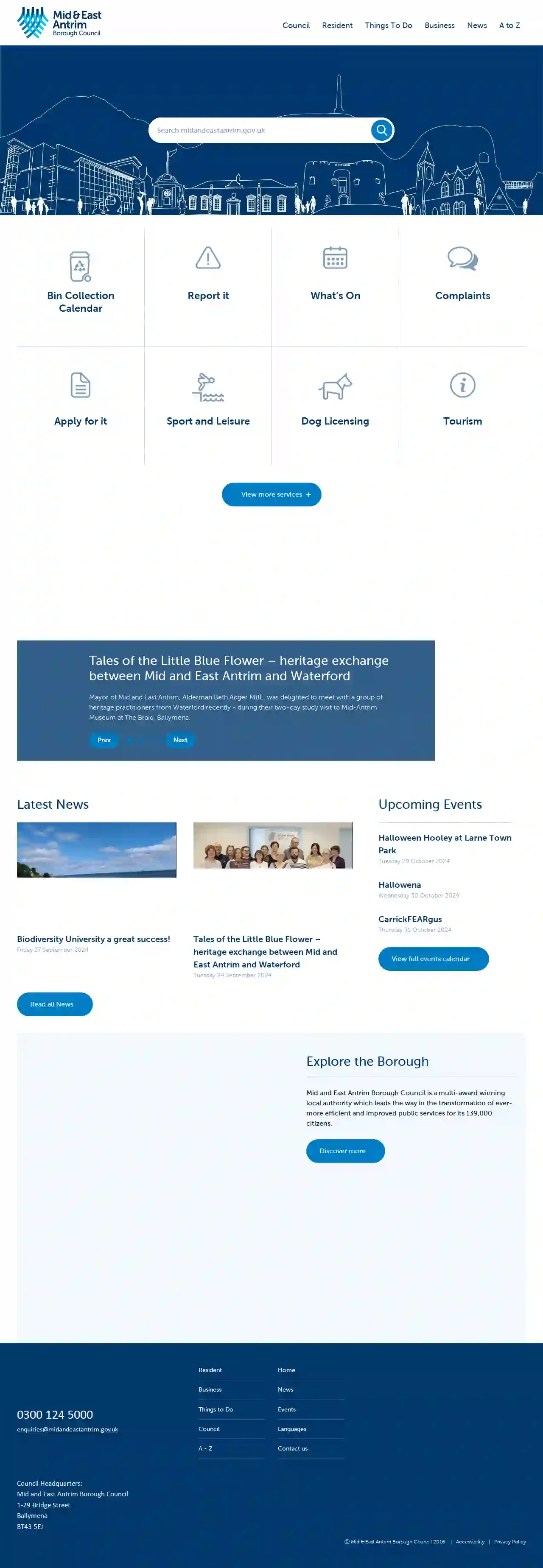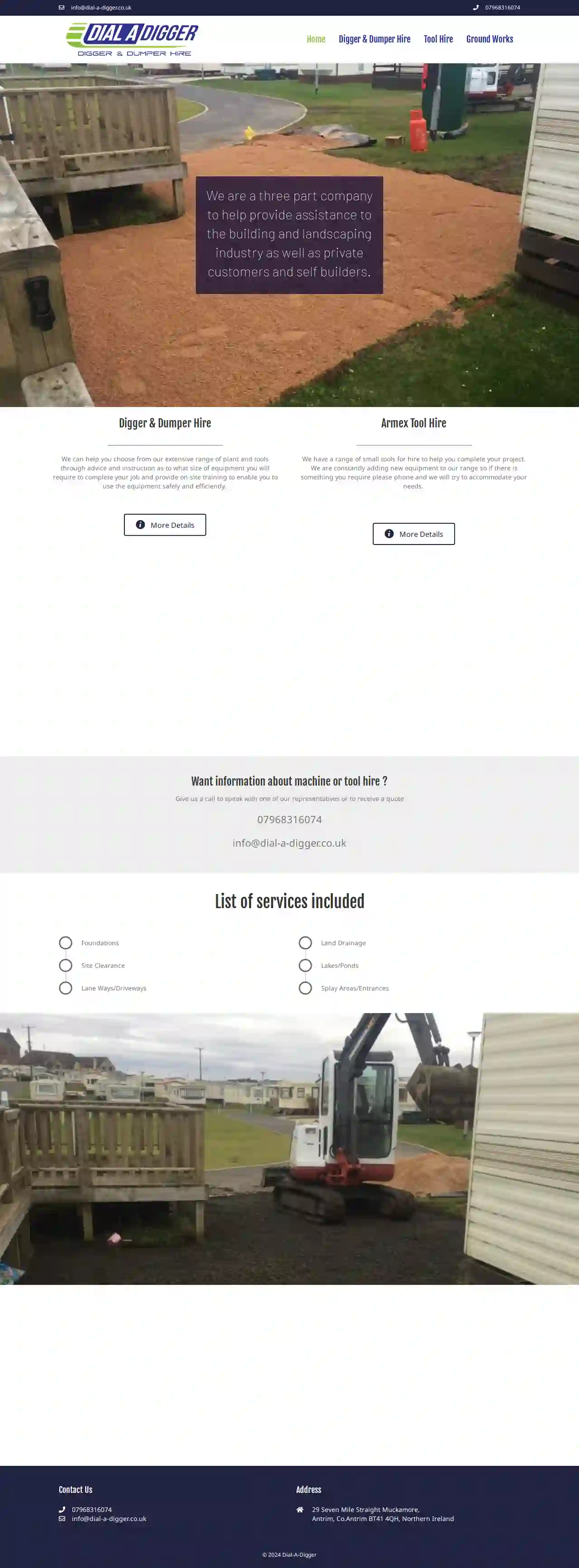Excavation Contractors Antrim
Top Excavation Company Near Me in Antrim
Get multiple Trenching Services quotes for your project today! Compare profiles, reviews, accreditations, portfolio, etc... and choose the best offer.

Mid and East Antrim Borough Council
52 reviewsCarrickfergus Museum & Civic Centre, 11 Antrim Street, Carrickfergus, BT38 7DG, GBAbout Mid and East Antrim Borough Council Mid and East Antrim Borough Council is a multi-award winning local authority which leads the way in the transformation of ever-more efficient and improved public services for its 139,000 citizens. Our History Mid and East Antrim was formed in the shadow format following the elections on 22 May 2014, when 40 elected members were appointed to represent the new area, replacing the predecessor councils of Ballymena, Carrickfergus and Larne Borough Councils from 1 April 2015. The new Council was established as part of the programme for local government reform, the most significant change in over 40 years. The purpose of the reform process is to create a “thriving dynamic local government that creates vibrant, healthy, prosperous, safe and sustainable communities that meets the needs of the citizens” and aims to deliver improved service provision and long-term cost savings. For us, this provides a once in a political lifetime opportunity to do things differently and to do different things. Our focus is always to improve the quality of life for our citizens.
- Services
- Why Us?
- Gallery
Get Quote
Dial A Digger- Dumper Digger Hire Ground Works.
4.818 reviews29 Seven Mile Straight Muckamore, Antrim, Co.Antrim, BT41 4QH, GBDial-A-Digger: Your One-Stop Shop for Digger & Dumper Hire, Tool Hire, and Ground Works Dial-A-Digger is a comprehensive company dedicated to providing top-notch services to the building and landscaping industry, as well as private customers and self-builders. We offer a wide range of services, including digger and dumper hire, tool hire, and ground works. Our team is committed to providing expert advice and guidance to help you choose the right equipment for your project, ensuring you have the tools and knowledge to complete your job safely and efficiently. Whether you're a seasoned professional or a DIY enthusiast, Dial-A-Digger has the equipment and expertise to meet your needs. We pride ourselves on our extensive range of plant and tools, and we're always adding new equipment to our inventory. If you have a specific requirement, don't hesitate to give us a call, and we'll do our best to accommodate your needs.
- Services
- Why Us?
- Gallery
Get Quote- Be
Bespoke Landscaping Projects Ltd
56 reviewsAntrim, GB- Services
- Why Us?
Get Quote - El
Elmwood Construction
Antrim, GB- Services
- Why Us?
Get Quote - Am
Ammlee Group International Ltd
53 reviewsAntrim, GB- Services
- Why Us?
Get Quote - AJ
AJ McMinn Groundworks & Plant Hire
51 reviewsAntrim, GB- Services
- Why Us?
Get Quote
Over 13,059+ Excavation Contractors registered
Our excavation pros operate in Antrim & beyond!
ExcavationHQ has curated and vetted the Best Excavation Pros in Antrim. Find a top & trustworthy business today.
Frequently Asked Questions About Excavation Contractors
- New Construction: Laying foundations, basements, or underground utilities for new buildings.
- Home Additions: Creating space for new rooms, basements, or extensions.
- Landscaping: Leveling ground, creating slopes, installing retaining walls, or digging for ponds or pools.
- Drainage Improvement: Installing French drains, drainage ditches, or swales to manage water runoff.
- Utility Installation or Repair: Laying new water, sewer, gas, or electrical lines, or repairing existing ones.
- Demolition: Clearing debris and preparing the site after demolishing a structure.
- Sloped Property: Your property has a significant slope, making it prone to soil erosion or landslides.
- Creating Usable Space: You want to level off a sloped area to create a flat surface for patios, gardens, or other outdoor spaces.
- Preventing Damage: Erosion is threatening existing structures, driveways, or walkways.
- Landscaping Features: You're incorporating tiered gardens, raised beds, or other landscaping elements requiring soil retention.
- Experience: Choose contractors with a proven track record and years of experience in excavation projects similar to yours.
- Licensing and Insurance: Verify that they are properly licensed to operate in your area and carry adequate insurance to protect you from liability in case of accidents or damage.
- Equipment and Resources: Ensure they have the necessary equipment and resources to handle your project efficiently and safely.
- Positive Reviews and References: Check online reviews and testimonials from previous customers. Request references and contact them to inquire about their experience with the contractor.
- Professionalism: Opt for a company that communicates clearly, provides detailed and transparent estimates, and has a responsive and courteous team.
- Utility Locates: Contact your utility companies to mark the locations of underground lines before excavation begins. This is usually a free service.
- Hand Digging: Excavate carefully by hand near marked utility lines to avoid damage.
- Potholing: Digging small test holes to expose and verify utility depths and locations.
- Safe Distances: Maintaining a safe distance between excavation equipment and marked utility lines.
- Vacuum Excavation: Using vacuum excavation techniques to expose utilities without digging, reducing the risk of damage.
How do I know if I need excavation for my project?
How do I know if I need a retaining wall?
How do I find a good excavation contractor?
How do you protect utilities during excavation?
How do I know if I need excavation for my project?
- New Construction: Laying foundations, basements, or underground utilities for new buildings.
- Home Additions: Creating space for new rooms, basements, or extensions.
- Landscaping: Leveling ground, creating slopes, installing retaining walls, or digging for ponds or pools.
- Drainage Improvement: Installing French drains, drainage ditches, or swales to manage water runoff.
- Utility Installation or Repair: Laying new water, sewer, gas, or electrical lines, or repairing existing ones.
- Demolition: Clearing debris and preparing the site after demolishing a structure.
How do I know if I need a retaining wall?
- Sloped Property: Your property has a significant slope, making it prone to soil erosion or landslides.
- Creating Usable Space: You want to level off a sloped area to create a flat surface for patios, gardens, or other outdoor spaces.
- Preventing Damage: Erosion is threatening existing structures, driveways, or walkways.
- Landscaping Features: You're incorporating tiered gardens, raised beds, or other landscaping elements requiring soil retention.
How do I find a good excavation contractor?
- Experience: Choose contractors with a proven track record and years of experience in excavation projects similar to yours.
- Licensing and Insurance: Verify that they are properly licensed to operate in your area and carry adequate insurance to protect you from liability in case of accidents or damage.
- Equipment and Resources: Ensure they have the necessary equipment and resources to handle your project efficiently and safely.
- Positive Reviews and References: Check online reviews and testimonials from previous customers. Request references and contact them to inquire about their experience with the contractor.
- Professionalism: Opt for a company that communicates clearly, provides detailed and transparent estimates, and has a responsive and courteous team.
How do you protect utilities during excavation?
- Utility Locates: Contact your utility companies to mark the locations of underground lines before excavation begins. This is usually a free service.
- Hand Digging: Excavate carefully by hand near marked utility lines to avoid damage.
- Potholing: Digging small test holes to expose and verify utility depths and locations.
- Safe Distances: Maintaining a safe distance between excavation equipment and marked utility lines.
- Vacuum Excavation: Using vacuum excavation techniques to expose utilities without digging, reducing the risk of damage.